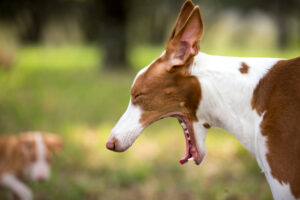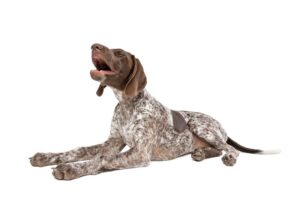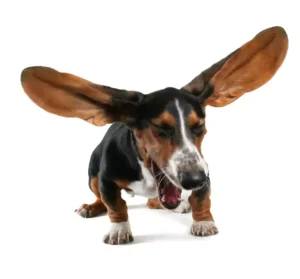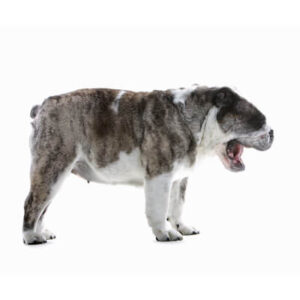Sneezing is a natural reflex that helps to clear the nasal passages and protect the respiratory system from irritants and foreign particles. It is common for dogs to sneeze occasionally; there are reasons for that. In this article, we will explore some common reasons why do dogs sneeze and how to care for them if they are sneezing excessively.
Dogs, like humans, sneeze for a variety of reasons which are: to get rid of dust, germs, and fleas, to release moisture trapped in their throats, to clean out their noses, to clear out mucus or discharge from the nasal passages, to increase air pressure in their lungs, to remove mucus that has been trapped in their throat and nasal passages.
They also sneeze a lot, especially if they are exposed to allergens or environmental irritants. However, if your dog is sneezing frequently or experiencing other symptoms, it is important to pay attention and seek veterinary care if necessary.
Why Do Dogs Sneeze?

Dogs sneeze for many of the same reasons that humans do. Allergies, respiratory infections, and exposure to environmental irritants are all common causes of sneezing in dogs.
Dogs can also inhale foreign objects, such as grass seeds, which can cause sneezing and other respiratory symptoms. In rare cases, sneezing can be a sign of a nasal tumor or other growth in the nasal passages.
Dental problems, sinus infections, and hormonal imbalances can also lead to sneezing in dogs. Some dogs may sneeze when they are excited or playing, especially if they are playing with other dogs or people.
It is important to note that excessive or persistent sneezing can be a sign of a more serious health problem, and it is always a good idea to consult with a veterinarian if you are concerned about your dog’s sneezing.
What are the most common reasons for dogs to sneeze?
The most common reasons dogs sneeze are dry air, an allergic reaction, or a cold. Dry air can cause dogs to sneeze, and it’s usually because they’re allergic to something in the environment around them.
For example, if you have a dog that lives inside and you run an air conditioner, the dry air can cause him to sneeze. If your dog has allergies or is recovering from a cold, he might sneeze because his immune system is fighting off germs.
If you notice that your dog has been sneezing more than usual, talk to your veterinarian about what you can do at home to help him feel better.
Can allergies cause dogs to sneeze?

Allergies can cause dogs to sneeze. Allergies occur when the immune system reacts to a substance (called an allergen) that is normally harmless. Dogs can develop allergies to various substances, including pollen, dust, certain foods, and even certain plastics or chemicals.
An allergen can cause symptoms such as sneezing, coughing, runny nose, and itchy skin when a dog is exposed to an allergen. If your dog is sneezing and experiencing other symptoms of allergies, it is important to consult with a veterinarian to determine the cause and receive appropriate treatment.
Is it normal for dogs to sneeze frequently?
It is common for dogs to sneeze occasionally, especially if they are exposed to allergens or environmental irritants. However, if your dog is sneezing frequently or experiencing other symptoms, it is important to pay attention and seek veterinary care if necessary.
Excessive or persistent sneezing can signify a more serious health problem, such as a respiratory infection, nasal tumor, or other underlying condition. It is always a good idea to consult with a veterinarian if you are concerned about your dog’s sneezing.
The veterinarian will be able to examine your dog and determine the cause of the sneezing and recommend the appropriate treatment.
Can respiratory infections cause dogs to sneeze?

Respiratory infections can cause dogs to sneeze. Respiratory infections are common in dogs and can be caused by various viruses and bacteria. Kennel cough, influenza, and pneumonia are respiratory infections that can affect dogs.
Sneezing is a common symptom of respiratory infections in dogs, along with coughing, runny nose, and fever. If your dog is sneezing and experiencing other respiratory infection symptoms, it is important to seek veterinary care as soon as possible.
The veterinarian can diagnose the infection and recommend the appropriate treatment, including antibiotics or other medications.
In some cases, respiratory infections can be serious and may require hospitalization. Consult with a veterinarian if you are concerned about your dog’s health is always a good idea.
Can foreign objects stuck in the nose cause dogs to sneeze?
Foreign objects stuck in the nose can cause dogs to sneeze. Dogs can sometimes inhale foreign objects, such as grass seeds, which can cause sneezing and other respiratory symptoms.
If you suspect your dog has inhaled a foreign object, it is important to seek veterinary care as soon as possible. The veterinarian will be able to examine your dog and determine the best course of treatment, which may include removing the foreign object or prescribing medication to help clear the nasal passages.
In some cases, surgery may be necessary to remove the foreign object. Supervising your dog when they are outside is always a good idea to help prevent them from inhaling foreign objects.
Can dental problems cause dogs to sneeze?

Dental problems can cause dogs to sneeze. Dental problems such as infected teeth or gums can lead to inflammation in the nasal passages and sinuses, which can cause sneezing.
Suppose your dog is sneezing and experiencing other symptoms of dental problems, such as bad breath, difficulty eating, or swelling in the mouth. It is important to seek veterinary care as soon as possible.
The veterinarian will be able to examine your dog’s teeth and gums and determine the best course of treatment, which may include cleaning, extractions, or other dental procedures.
It is important to regularly brush your dog’s teeth and have their teeth and gums examined by a veterinarian to help prevent dental problems and maintain good oral health.
Can cancer or tumors cause dogs to sneeze?
In rare cases, cancer or tumors can cause dogs to sneeze. Nasal tumors or growths in the nasal passages can cause sneezing and other respiratory symptoms.
Suppose your dog is sneezing and experiencing other symptoms, such as nasal discharge, difficulty breathing, or a change in their sense of smell. In that case, it is important to seek veterinary care as soon as possible.
The veterinarian will be able to examine your dog and determine the cause of the symptoms. The veterinarian may recommend further testing, such as x-rays or a biopsy if a tumor is suspected to confirm the diagnosis.
Treatment for nasal tumors may include surgery, chemotherapy, or other therapies. Consult with a veterinarian if you are concerned about your dog’s health is always a good idea.
Can hormonal imbalances cause dogs to sneeze?

Hormonal imbalances can cause dogs to sneeze. Certain hormonal imbalances, such as those caused by Cushing’s disease, can lead to sneezing in dogs. Cushing’s disease is a condition in which the body produces too much of the hormone cortisol.
Symptoms of Cushing’s disease in dogs include excessive thirst and urination, increased appetite, panting, and thinning of the skin and hair. If your dog is sneezing and experiencing other symptoms of a hormonal imbalance, it is important to seek veterinary care as soon as possible.
The veterinarian can diagnose the underlying cause of the symptoms and recommend the appropriate treatment.
Can environmental factors such as pollution or dust cause dogs to sneeze?
Environmental factors such as pollution and dust can cause dogs to sneeze. Dogs can be sensitive to environmental irritants like smoke, perfume, and household cleaning products.
Exposure to these irritants can cause sneezing and other respiratory symptoms in dogs. Minimizing your dog’s exposure to environmental irritants whenever possible is important to help prevent respiratory symptoms.
If your dog is sneezing and experiencing other symptoms of an environmental irritant, it is important to pay attention and seek veterinary care if necessary.
The veterinarian can diagnose the cause of the symptoms and recommend the appropriate treatment. Can dogs sneeze due to sinus issues or nasal congestion?
Can dogs sneeze when they have a cold or flu?

Dogs can sneeze when they have a cold or flu, but this isn’t common. It is important to know that dogs do not have a cold or flu themselves, but their immune system is weakened due to the infection.
When a dog has an infection, it can make its nose run and cause them to sneeze. This happens because the dog’s immune system tries to fight off the virus and protect its lungs from getting infected with bacteria.
Respiratory infections such as kennel cough and the flu can cause sneezing and other symptoms in dogs, including coughing, runny nose, and fever.
If your dog is sneezing and experiencing other respiratory infection symptoms, it is important to seek veterinary care as soon as possible.
In some cases, respiratory infections can be serious and may require hospitalization. Consult with a veterinarian if you are concerned about your dog’s health is always a good idea.
Can sneezing in dogs be a sign of something serious?
While sneezing is a normal and healthy reflex, excessive or persistent sneezing can signify a more serious health problem in dogs.
Sneezing in dogs can sometimes be a sign of something more serious. Some causes of sneezing in dogs include nasal congestion, sinuses, allergies, and eye disease. Sneezing may also be related to an upper respiratory infection.
Suppose your dog is sneezing frequently or experiencing other symptoms such as nasal discharge, difficulty breathing, or a change in their sense of smell. In that case, paying attention and seeking veterinary care, if necessary, is important.
Possible causes of excessive or persistent sneezing in dogs include allergies, respiratory infections, foreign objects in the nasal passages, nasal tumors, dental problems, sinus infections, and hormonal imbalances.
What should I do if my dog is sneezing frequently or excessively?

If your dog is sneezing frequently or excessively, it is important to pay attention to it to know its cause and how to handle its situation. Here are a few steps you can take if your dog is sneezing frequently or excessively:
1. Keep track of your dog’s sneezing: Try to note how often it is sneezing and whether it is experiencing any other symptoms. This information can be helpful for the veterinarian in determining the cause of the sneezing.
2. Minimize your dog’s exposure to potential irritants: If you suspect that your dog‘s sneezing is being caused by an allergy or environmental irritant, try to minimize your dog’s exposure to the irritant.
3. Keep your dog’s nasal passages clear: If your dog’s sneezing is caused by a foreign object in the nasal passages, try gently removing the object with tweezers or a soft cloth. Do not try to remove the object if it is deeply embedded or if you are unable to do so safely.
4. Follow the veterinarian’s recommendations: If you are concerned about your dog’s sneezing, consult a veterinarian. The veterinarian will be able to examine your dog and recommend the appropriate treatment. Follow the veterinarian’s recommendations to help your dog recover quickly.
Conclusion
Allergies, respiratory infections, foreign objects stuck in the nasal passages, nasal tumors, dental problems, sinus infections, hormonal imbalances, and environmental irritants are all common causes of sneezing in dogs.
While sneezing is a normal and healthy reflex, excessive or persistent sneezing can be a sign of a more serious health problem. It is important to seek veterinary care if necessary. If you are concerned about your dog’s sneezing, consult a veterinarian.
The veterinarian will be able to examine your dog and determine the cause of the sneezing and recommend the appropriate treatment. Consult with a veterinarian if you are concerned about your dog’s health is always a good idea.
Why do dogs sneeze with 10 top reasons has been our topic on this page today; we hope you have gained more insight into it than you expected.

